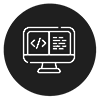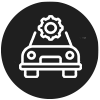Building your own vehicle application with Eclipse SDV
Developers working on bringing their applications to a vehicle face common challenges, like how to get data in and out of the heterogeneous system architecture. Solving these challenges for each application and each model binds a lot of development time without adding much value for the driver. Therefore, it is reasonable to work with a reliable software stack that solves and abstracts many of these recurring issues. The participants of the Eclipse SDV working group aim to build such an open technology platform to accelerate the innovation of automotive-grade in-car software stacks.


